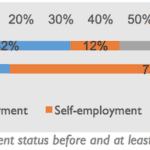Africa is Done Waiting: 10 Key Takeaways from Africa HealthTech Summit 2025
Last week, I attended the Africa HealthTech Summit in Kigali, Rwanda. NextBillion was a media partner at this year’s Summit, which focused on “scaling innovation towards universal health coverage.”
Here are 10 takeaways from the conference, along with four videos with some key thought leaders who served as panelists at the event.
1. Youth-led innovation
As Ntwali Ivan, Country Director Rwanda at Mastercard Foundation put it in the Summit’s opening ceremony: Young people are Africa’s greatest asset and the continent’s most powerful source of hope. They’re also helping to drive the digital transformation that’s sweeping through health systems in Rwanda and other African markets. (Learn more about Mastercard Foundation’s work in Africa in the interview with Samuel Yalew Adela, below.)
Dr. Sabin Nsanzimana, Rwanda’s Minister of Health, emphasized in his keystone address that more than 70% of Africans are 30 years old or younger, and they will develop the technologies and discoveries that may drive the future. But technology alone — without humanity, without equity, without values — is not going to help us, he said. That’s why policymakers and others must help create the environment for equitable change to happen, instead of blocking or confusing young innovators.
2. A focus on data and digitization
The digitization of health information and the widespread use of this data to optimize not only patient services, but also the healthcare workforce, medical supply chains, financing platforms and more was a key theme at the event.
Indeed, in a presentation during the Summit’s first day, Yvan Butera, Minister of State in Rwanda’s Ministry of Health, officially launched two AI-powered digital health apps, e-Buzima and e-Banguka, that are designed to strengthen connections and improve service delivery across the country’s healthcare ecosystem. E-Buzima is a platform that digitizes patients’ medical records and synchronizes their data across health facilities, enabling patients to self-assess minor health issues, schedule appointments and consult doctors remotely, while e-Banguka provides real-time ambulance tracking and dispatch services to enhance emergency medical response.
At the end of his presentation, Butera elicited gasps and applause from the audience when he asked them to guess the average age of the people who developed these innovations. The answer: 21.
3. The need for interoperability
With the progress Rwanda has made in digitizing health records, and the huge proliferation of apps and platforms that are emerging to streamline every aspect of patients’ and other stakeholders’ interactions with the health system, many panelists emphasized a key need: interoperability. As Nsanzimana put it: We need systems that talk to each other.
To that end, Rwanda is building an integrated healthcare system that allows patients (and their health records) to navigate seamlessly between service providers ranging from pharmacies, emergency services and community clinics to doctors, hospitals and specialty care providers. Some panelists also called for this system-wide interoperability and patient data access to extend across African borders (though they acknowledged the challenges this may represent).
4. The value of artificial intelligence
With Rwanda’s focus on tech innovation and the massive influx of digital data coming into its healthcare system, AI was naturally a major topic of conversation at the Summit. As Nsanzimana memorably framed it, there have been three discoveries in the history of medicine that have really changed the way humans live: the discovery of vaccines in 1796, the discovery of antibiotics in 1928, and AI today.
Panelists discussed how AI’s ability to process massive amounts of data is helping to track disease outbreaks, optimize service delivery, enable the procurement and delivery of medical supplies, and more. In a session on “AI for Primary Health Care,” panelists discussed the high diagnostic accuracy some AI systems are able to achieve, which can enable a “doctor in your pocket” approach in which frontline healthcare workers use AI-enabled apps to bypass the human resource limitations in physician-provided care.
5. A shifting funding environment
Unsurprisingly, the turmoil in the global aid sector was a much-discussed topic at the Summit. Yet the tone around these funding cuts was decidedly more positive than it is in many donor countries. Several panelists spoke of the cuts as an opportunity to shift the focus away from foreign aid driven by external donors, and toward homegrown innovation driven by African innovators and governments.
As Dr. Landry Dongmo Tsague, Director, Center for Primary Health Care at Africa CDC put it, there are several pillars for addressing health financing in this new funding reality, including: increasing domestic allocation through national budgets, leveraging blended financing and other innovative approaches, and seeking efficiency gains in local health systems through digital innovation. Many Summit panelists and attendees seemed eager for Africa to shape its own destiny in these and other areas.
6. Moving past “pilotitis”
Speaking of the downsides to global aid and development initiatives, a number of speakers highlighted the issue of “pilotitis,” in which a multitude of pilot programs are funded by unconnected, uncoordinated NGOs or multilateral agencies, providing health products or services which then compete with each other and never scale, while preventing market-based, locally developed alternatives from taking root — and complicating governments’ decisions about which solutions to support.
Caitlin Burton at Zipline Africa shares her thoughts on pilotitis and other topics in the interview below.
7. International partnerships remain relevant
Despite the much-discussed need for Africa to move past dependence on international support, Ozonnia Ojielo, United Nations Resident Coordinator, Rwanda pointed out that there is still a role for global development organizations to play. Digital health success is fundamentally a partnership story, he said, and there is not one single institution that possesses the full spectrum of resources, expertise and political will to digitize an entire national health ecosystem.
He described the role of the UN system as that of a multiplier, bringing global standards, technical expertise and diverse partners to the table. As he put it, Rwanda’s momentum in modernizing its healthcare system demonstrates that strong government ownership, an innovative domestic ecosystem and international partnerships form a winning combination.
8. The role of the private sector
As Rowena Luk, Managing Partner, Africa Health Ventures stated, “The private sector has always been the natural birthplace of innovation.” (See NextBillion’s interview with her below). The Summit drew hundreds of entrepreneurs and innovators from Africa and around the world, all seeking opportunities in the continent’s vibrant health marketplace. Indeed, at the closing plenary, a panelist asked how many of the audience members were from the private sector, and around half raised their hands — far more than those who identified themselves as coming from the public or development sectors.
But as Dr. Conrad Tucker, Director, Carnegie Mellon University Africa pointed out: Before the continent can scale innovation, it needs to create innovation — and that’s not an easy feat. He explored the role of education in training African students to develop local solutions to the region’s health challenges, warning that if AI and other digital health solutions proceed like other technologies that have come to the continent, Africa could become dependent on innovations developed in other countries, which may not be suited to its unique needs.
9. The government as the customer
According to Joanne Peter at Jhpiego and HealthTech Hub Africa (as shared in the interview below), if healthtech entrepreneurs really want to move the needle in Africa, they need to be selling their solutions into government, rather than just selling directly to consumers. But as she put it, there’s an ongoing disconnect between private sector entrepreneurs and public sector agencies: “Governments don’t always know how to procure innovations from the private sector, and private sector innovators don’t know how to be procurement-ready. And that means that oftentimes, these very exciting solutions are not making their way to the people that could benefit the most from them.”
She highlighted another concern that was discussed widely at the Summit: technology outpacing regulation. “On the policy and regulatory front, oftentimes the innovation is moving faster than the policy, which means that innovators are working either in a void, with an absence of fit-for-purpose policies, or sometimes they’re working with policies that are out of date. Or ministries are nervous because things are moving very quickly, and they can sometimes have a tendency to over-regulate, because they’re not confident about the risks that come with the technology. So creating an enabling environment for innovators is something that’s challenging.”
10. Africa is Done waiting
One term was mentioned so often onstage that it practically became the unofficial theme of the Summit: “collaboraction.” There was a palpable impatience with partnerships that don’t lead to progress, pilots that don’t scale, and narratives that portray Africa as waiting passively for the global community to solve its healthcare and broader development challenges.
As many panelists and attendees put it, Africa is done waiting for external solutions: It’s full of young innovators who are taking action to create solutions of their own, while partnering with governments, investors and other local stakeholders who are determined to support them. In countries like Rwanda, healthtech innovations are coming online that outpace what’s available in many markets in the Global North. As the fourth African HealthTech Summit concluded, drawing roughly twice as many attendees as the previous year (according to Joanne Peter’s estimation), it’s clear that the continent has the talent, technology and determination to take the lead in transforming its healthcare systems.
A number of panelists expressed the hope that the global narrative around African innovation will soon catch up to the reality that’s so clearly visible in Rwanda and across the region. The continent has become a hotbed of innovation, in healthtech and many other sectors, and its leadership in these areas is becoming impossible to ignore.
James Militzer is the managing editor of NextBillion.
Photo credit: James Militzer
- Categories
- Health Care



